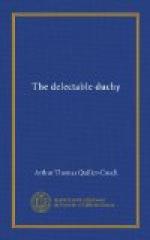Johnny was turning to me triumphantly, when his father caught him by the hand and led him back to his dressing. The movement was hasty, almost rough. I stood at the cabin-door and looked after them.
We were fellow-passengers aboard the Midas, a merchant barque of near on a thousand tons, homeward bound from Cape Town; and we had lost sight of the Table Mountain but a couple of days before. It was the first week of the new year, and all day long a fiery sun made life below deck insupportable. Nevertheless, though we three were the only passengers on board, and lived constantly in sight of each other, it was many days before I made any further acquaintance with Johnny and his father. The sad-faced man clearly desired to avoid me, answering my nod with a cold embarrassment, and clutching Johnny’s hand whenever the child called “Good-morning!” to me cordially. I fancied him ashamed of his foolish falsehood; and I, on my side, was angry because of it. The pair were for ever strolling backwards and forwards on deck, or resting beneath the awning on the poop, and talking—always talking. I fancied the boy was delicate; he certainly had a bad cough during the first few days. But this went away as our voyage proceeded, and his colour was rich and rosy.
One afternoon I caught a fragment of their talk as they passed, Johnny brightly dressed and smiling, his father looking even more shabby and weary than usual. The man was speaking.
“And Queen Victoria rides once a year through the streets of London on her milk-white courser, to hear the nightingales sing in the Tower. For when she came to the throne the Tower was full of prisoners, but with a stroke of her sceptre she changed them all into song-birds. Every year she releases fifty; and that is why they sing so rapturously, because each one hopes his turn has come at last.”
I turned away. It was unconscionable to cram the child’s mind with these preposterous fables. I pictured the poor little chap’s disappointment when the bleak reality came to stare him in the face. To my mind, his father was worse than an idiot, and I could hardly bring myself to greet him next morning, when we met.
My disgust did not seem to trouble him. In a timid way, even, his eyes expressed satisfaction. For a week or two I let him alone, and then was forced to speak.
It happened in this way. We had spun merrily along the tail of the S.E. trades and glided slowly to a standstill on a glassy ocean, and beneath a sun that at noon left us shadowless. A fluke or two of wind had helped us across the line; but now, in 2 deg. 27’ north latitude, the Midas slept like a turtle on the greasy sea. The heat of the near African coast seemed to beat like steam against our faces. The pitch bubbled like caviare in the seams of the white deck, and the shrouds and ratlines ran with tears of tar. To touch the brass rail of the poop was to blister the hand, to catch a whiff from the cook’s galley was to feel sick for ten minutes. The hens in their coops lay with eyes glazed and gasped for air. If you hung forward over the bulwarks you stared down into your own face. The sailors grumbled and cursed and panted as they huddled forward under a second awning that was rigged up to give them shade rather than coolness; for coolness was not to be had.




